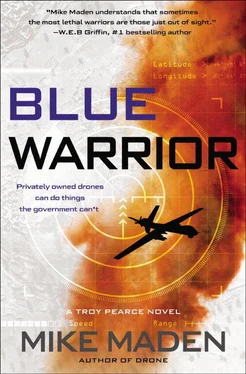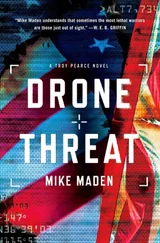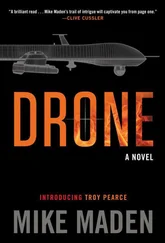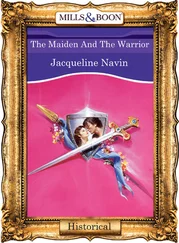“Sorry, ma’am. Didn’t mean to wake you.” An athletically built young Asian woman stood next to the light switch. She wore Nike printed tights and a top, along with a windbreaker that barely covered her shoulder-holstered pistol.
Myers lowered her shotgun, relieved. “You’re one of Pearce’s people, aren’t you?”
“Yes, ma’am. Stella Kang.” She extended her hand. “It’s a pleasure to finally meet you.” Stella was a Korean-American from Los Angeles who picked a career in the Army over jail time for a crime she committed while attending USC. She accidentally chose the Army’s drone program and learned to fly Ravens. After one tour over in the Sand Box she returned home and eventually wound up at Pearce Systems as one of his field operatives specializing in drone ops.
“What on earth are you doing here?” Myers checked her watch. “And at this ungodly hour?”
“Ian sent me.”
“What for?”
“He’s a big believer in backup systems. I guess I’m your backup, especially since you ditched your Secret Service detail after you resigned.”
“Ian is a worrywart.”
“He thinks you’re being monitored out here. He’s concerned about your security situation.” She nodded at the small-gauge shotgun. “No offense.”
Myers patted her gun. “If I’m attacked by a flock of pigeons, I’ll be fine. You hungry? All I have is Spam around here.”
Kang brightened. “Are you kidding? I grew up on Spam. Some tea would be great, too. We still have time.”
Myers propped the shotgun in the corner. “Time for what?
“Ian wouldn’t give me all of the details, but he wants to put some other pieces into play. We’ve got to roll.”
“Where to?”
Stella shrugged. “No telling, but I’d pack light if I were you.”
Tassili du Hoggar, Tamanghasset Province
Southern Algeria
The camels drank their fill again while the rest of camp packed up their few belongings. They had all dined on the cold Turkish army rations Mossa and his men had hauled from the caves in Adrar. They wanted to get moving fast before the heat stole away the better part of the day.
Mossa approached Pearce, a small leather bag slung over his shoulder. His tagelmust hadn’t been wrapped around his face yet. Pinpoints of silver dotted his unshaved skin.
“Today you will enter the Sahara as you Westerners imagine it. It is more beautiful and more terrible than you know. I should like to give you something to help you survive the journey.” Mossa reached into his leather bag and set something into Pearce’s hand.
“A date?” Pearce asked. The fruit was small and hard.
“It is God’s survival pack. If you get lost out there, this date will allow you to survive for three days. The first day you eat the skin, the second day you eat the meat of it, and the third day you suck on the seed to generate water in your mouth.”
“And the fourth day?”
“If you have not found water by the fourth day, you are dead.” Mossa reached into his leather bag and tossed Pearce another date, laughing. “Here’s three more days.”
Pearce smiled, examining the dates. “Better than MREs, probably.”
“One more thing. Give me your hat. It’s ridiculous.”
Pearce had been wearing his sweat-stained floppy boonie hat since Mozambique. It had done a pretty good job keeping the sun off of his face and neck, but it screamed to the world he was a Westerner, probably a soldier. He handed Mossa his hat. Mossa tossed it to the ground and pulled something else out of his pack.
“I would be honored if you would wear this,” Mossa said. It was ten feet of indigo cloth. A tagelmust .
“I don’t deserve it.”
“You have fought well. I suspect you will have to fight again before we reach our destination. Since you fight like a brother, you might as well look like one.” Mossa looked at the pile of folded cloth in his hand. “Pretty cool, eh?”
“Damn straight,” Pearce said. He took it and unfolded it, obviously pleased. “Better show me how to put it on.”
 53
53 
Tamanghasset Province
Southern Algeria
14 May
The huge transverse sand dunes rolled in great, granular waves. Mossa was right. This was the Sahara of Pearce’s imagination. Straight out of Lawrence of Arabia . As thrilling as any seascape he’d ever seen, but silent as the blinding sunlight glinting on the billions of microscopic bits of quartz.
“Yes, rolling. A good description. These barchans really do move,” Mann said, using the technical term for the huge dunes. “Up to a hundred meters per year.” The German wore a white towel on his head secured with a bungee cord. A primitive keffiyeh . His long nose was painted with zinc oxide. The caravan snaked between the dunes, careful to avoid the steep slip faces, which could avalanche down.
“Nice hat,” Pearce said.
“Not as authentic as yours, but it works.”
“How are the girls?”
Mann had recently settled down with a younger wife. The union had produced beautiful twin girls. They lived in England where most of the nuclear power plant demolition work he supervised was taking place.
“They’re becoming too English. I only speak to them auf Deutsch anymore.”
Pearce hadn’t seen the dark-haired German since the Mexico operation. Missed his company.
“Seems like you and I are always around the sand, one way or another.” They first met years before while windsurfing off the coast of California, not far from Pearce’s beachfront condo in Coronado.
“I forgot to bring my board. You?” The German grinned.
“Didn’t even bring my shorts.”
Truth was, Pearce was in heaven. He’d seen plenty of sand before, especially in Iraq. But somehow there it was a nuisance, a constant grit that got in his teeth and eyes. Sometimes it was so fine it was like talcum powder. And there was no shortage of heat over there, either. But out here, on the dunes of the Sahara, it all felt so clean. Purified. Now he understood, at least a little, why the ancient monks had fled to the desert. But maybe it felt clean because there weren’t any people around. People had a way of ruining things.
———
Six hundred and thirteen meters now,” Salah said. His Chinese-made military binoculars featured a laser range finder. The AQS fighter was perched just below the crest of the dune, his body carefully hidden. Only his head and binoculars were on the crest line—barely—and the tinted lenses were designed to not reflect the harsh sunlight. There was nowhere to hide in the desert once you were seen.
“How many?” Al Rus asked. He was standing in the bed of his Nissan pickup next to the big machine gun, his short-barreled AK still strapped to his chest. Four other armed pickups were next to him, engines off. They were in the flattest part of the trough between two big rollers. Beige camouflage webbing tented over their vehicles, partly to hide, partly for shade. Not nearly as efficient as camels and far louder, the trucks still made the journey easily enough after his men lowered the air pressure in the oversize tires to improve traction.
“Seven.” Salah was still winded from the long, hard crawl up the far slope of the dune. “Six Tuaregs. And one fool wearing a dish towel on his head.”
Al Rus’s men laughed. The oldest, Abdelmalek, said, “That must be Pearce.”
Читать дальше

 53
53 











